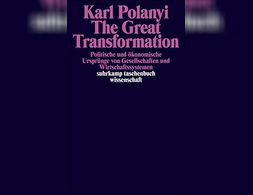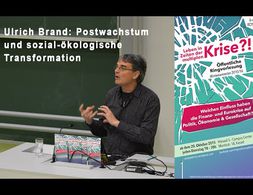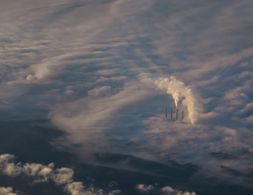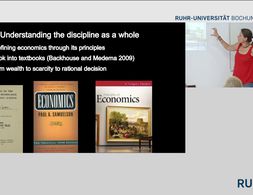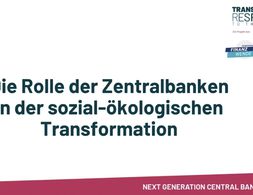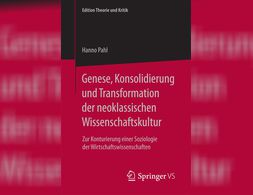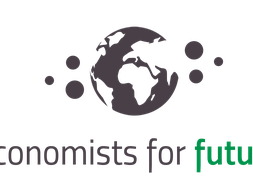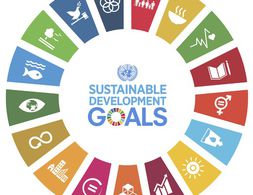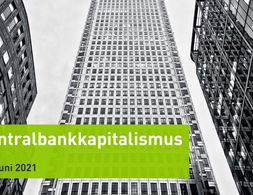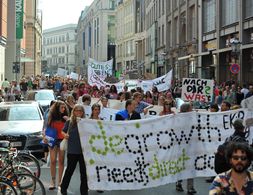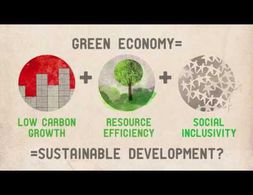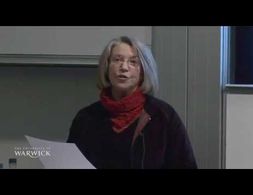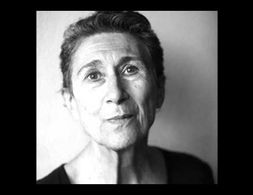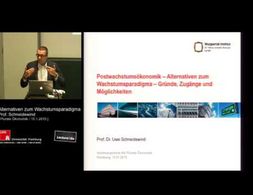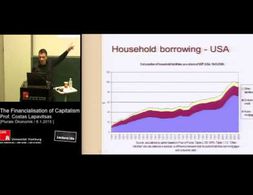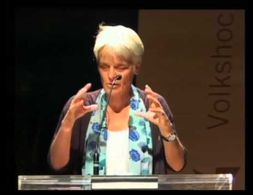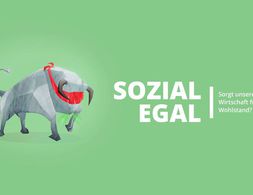219 Ergebnisse
Die Vereine Konzeptwerk Neue Ökonomie und Fairbindung e.V. haben gemeinsam mit dem Webportal „Endlich Wachstum! Bildungsmaterialien für eine sozial-ökologische Transformation eine umfassende Methodensammlung aus über 100 Methoden veröffentlicht. Die Methoden regen auf vielfältige Weise dazu an, sich mit Bedingungen unseres derzeitigen Wirtschaftens sowie möglichen Alternativen zu beschäftigen.
The Great Transformation, 1944 erschienen, geht von der These aus, daß erst die Herausbildung einer liberalen Marktwirtschaft mit ihrem »freien Spiel der Kräfte« zu jener charakteristischen »Herauslösung« und Verselbständigung der Ökonomie gegenüber der Gesellschaft geführt hat, die historisch ein Novum darstellt und die bürgerliche Gesellschaft von allen anderen Gesellschaftsformationen unterscheidet.
Was ist unter Krise und was unter multipler Krise zu verstehen? Ulrich Brand erläutert, wie unterschiedliche Krisen – wie die Finanz- & Wirtschaftskrise, die Krise der Ökologie oder der Reproduktion - zusammenhängen und diskutiert Ursachen dieser mutliplen Krise mit dem vom ihm geprägtem Begriff der imperialen Produktions- und Lebensweise. Anschließend erwägt Brand, wie Wege aus der Krise aussehen könnten und greift dabei Konzepte wie degrowth und sozial-ökologische Transformation auf.
The COVID-19 pandemic has had far-reaching implications across the African continent. This discussion brings to light the role of African think tanks, such as the African Center for Economic Transformation (ACET) in rethinking the continent’s development models, especially, in light of the unprecedented crisis.
In this classic work of economic history and social theory, Karl Polanyi analyzes the economic and social changes brought about by the "great transformation" of the Industrial Revolution.
Unternehmen wird eine besondere Veränderungsbereitschaft zugeschrieben, und die Hoffnung ist, dass sie zu einem neuen Bild der Wirtschaft beitragen. Darin fehlen jedoch wesentliche andere Institutionen, die den Unternehmen Grenzen setzen. Ein Beitrag von Sabrina Schmidt und Carla Young.
In this lecture, Beatrice Cherrier explains why it is worth to research the history of JEL codes. The changing relationship between theory and application and the rise and death of new economic topics in the XXth century through the successive revisions of the classification system economists use to publish, recruit and navigate their discipline.
Eine Paneldiskussion der Online-Konferenz "Next Generation Central Banking", die im Rahmen des Projekts "Transformative Responses" von Finanzwende und in Kooperation mit der Heinrich-Böll Stiftung organisiert wurde.
Beyond Growth is a collection of educational materials offering a reflection on growth. It was created as a joint project of the associations Fairbindung e. V. and Konzeptwerk Neue Ökonomie, both based in Germany. The page provides learning materials and methods to stimulate thinking about the conditions of our current economy as well as possible alternatives.
Das vorliegende Buch soll das Forschungsfeld einer Soziologie ökonomischen Wissens und der Wirtschaftswissenschaften konturieren.
Max Krahé explains the role of economic planning for a green transition.
Das Ziel des Green New Deal ist es, eine „soziale und ökologische Transformation unserer Wirtschaft“ anzustoßen (Giegold und Mack 2012, S. 40). Doch inwieweit werden bei der sozialen Transformation auch feministische Anliegen mitgedacht?
Economic development is a process of continuous technological innovation and structural transformation. Development thinking is inherently tied to the quest for sustainable growth strategies. This book provides a neoclassical approach for studying the determinants of economic structure and its transformation and draws new insights for development policy.
The book is a collection of 51 texts by different scholars and activists, who each adds a dimension/perspective to the topics of degrowth and societal transformation. A societal transformation towards a degrowth society is dependent on a lot of ideas coming together and creating change from various starting points within a society. Therefore, the authors are quite diverse and their contributions vary from being philosophical, natural science based, economic, sociological and so forth. Some are specfiically focused on a concept and others are a more broad critique of e.g., capitalism or growth.
Die alten kapitalistischen Zentren, aber auch die großen Schwellenländer befinden sich inmitten eines epochalen Umbruchs. Politikansätze, die das Problem der Klimaungerechtigkeit ignorieren, werden heftige Widerstände gegen die sozial-ökologische Transformation auslösen. Ein Beitrag von Klaus Dörre.
Oft wird so getan, als wenn es für den Kampf gegen den Klimawandel „nur“ einer Transformation des bisherigen Wirtschaftens bedarf. Doch die Klimakrise ist eine Krise des vorherrschenden Produktionsmodells – und der dafür benötigten Ressourcen.
Feminist economics critically analyzes both economic theory and economic life through the lens of gender, and advocates various forms of feminist economic transformation. In this course, we will explore this exciting and self-consciously political and transformative field.
Um die Klimakrise und ihre Ursachen wirklich zu bekämpfen, müssen die derzeitige Wirtschaftsweise grundlegender hinterfragt und Möglichkeiten einer sozial-ökologischen Transformation untersucht werden. Ein Beitrag von Elena Hofferberth.
Prof. Robert Guttmann looks at the current transformation of the international world order through the lenses of global money and finance.
Der Beitrag befasst sich mit der Schaffung finanztheoretischer Rahmenbedingungen hinsichtlich einer sozial-ökologischen Transformation der heutigen Wirtschaftsweise durch gezielt-effiziente Anpassung der Geschäftstätigkeit des globalen Bankensektors unter Betrachtung der resultierenden Folgewirkungen zwecks hinreichender Zielerfüllung im Sinne des Pariser Abkommens.
Wie erfüllen und finanzieren wir die Ziele des Pariser Abkommen / Climate Agreement (Social Development Goals (SDG) & Environmental Social Governance (ESG)) in nur noch 30 Jahren? Eine mögliche Antwort.
Dies ist eine Kooperationsveranstaltung zwischen Heinrich-Böll-Stiftung, Finanzwende Recherche und der Universität Witten-Herdecke.
Mit:
- Joscha Wullweber, Heisenberg-Professor für Politische Ökonomie, Transformation und Nachhaltigkeit an der Universität Witten-Herdecke
- Rainer Voss, Ex-Investmentbanker und Finanzwende-Fellow
- Ulrike Roy, Abteilungsleiterin, Deutsche Bundesbank
Begrüßung und Moderation: Jörg Haas, Referent Internationale Politik, Heinrich-Böll-Stiftung
Adhering to the multiplicity of degrowth whilst also arguing that strategic prioritisation and coordination are key, Degrowth & Strategy advances the debate on strategy for social-ecological transformation. It explores what strategising means, identifies key directions for the degrowth movement, and scrutinises strategies in practice that aim to realise a degrowth society.
What is sustainable development and what is the idea of a green economy? What is the role of the green economy in the current triple crisis? The short video discusses the concept and in particular the concerns about a green economy, especially with regards to inequality and poverty. The short statements in the video also reflect other possibilities of transformation.
Does Karl Polanyi's work “The Great Transformation” serve to analyse the current multiple crisis and social movements? Nancy Fraser revises Polanyi's concept of a double movement to capture social forces in the aftermath of the economic crisis of the 1930s – on the one side marketization and on the other hand social protection. Fraser proposes to talk about a triple movement and to account for emancipatory struggles. In the lecture, she discusses interactions as well as conflicts between those three forces, in particular conflicting aims of social protection. The lecture presents the content of her paper “A TRIPLE MOVEMENT? Parsing the Politics of Crisis after Polanyi“ in the New Left Review (2013).
Silvia Federici outlines the content of her book „Caliban and the Witch - Women, the Body and Primitive Accumulation“. Departing from a critique of the Marxist blindspot on reproductive labour, Federici aims at researching the historical process by which the exploitation of women and the construction of the unproductive housewife has been established. Federici points to the transition from the feudal to the capitalist mode of production and explains how the gender specific prosecution (witch hunt) was linked to necessity of control over bodies and the sexuality in the great transformation. Federici also presents arguments why this research is highly relevant for the analysis of women's situation in current capitalism.
Prof. Dr. Uwe Schneidewind führt in die Alternativen zum Wachstumsparadigma ein. Die Notwendigkeit verdeutlicht er an der Endlichkeit der Ressourcen bei zunehmenden Ressourcenverbrauch. Die Vorstellung von "grünem Wachstum" kritisiert er und erläutert die Wirkung von Rebound-Effekten. Die gesellschaftliche, politische Transformation als Feld der Postwachstumsgesellschaft wird erklärt und in Beziehung zur naturwissenschaftlichen, technischen Forschung gesetzt.
Economist and politician Costas Lapavitsas: presents differing theoretical definitions of financialization, namely from Marxist and Post-Keynesian thinkers and compares their approaches. By presenting pattern and features of the economic and financial crisis, he interprets the latter as a crisis of financialization. Lapavitsas emphasizes his arguments by presenting data from the U.S. and Germany on the transformation of business, banks and households.
In diesem Video spricht die Journalistin Ulrike Hermann vom Anfang und Ende des Kapitalismus. Zunächst erläutert Hermann, was unter Kapitalismus und Kapital verstanden werden kann. Anschließend grenzt sie Kapitalismus vom Begriff Marktwirtschaft ab. Neben Errungenschaften des Kapitalismus nennt sie insbesondere dessen Krisenhaftigkeit und folgende Gefährdungen für die Demokratie als Gründe, warum über eine Transformation zu einer post-kapitalistischen Wirtschaftsordnung nachgedacht werden muss. Der Vortrag endet bei Minute 54.
Mit digitaler Transformation geht in vielen Bereichen ein Aufbrechen von bestehenden Strukturen einher. Suchmaschinen vermitteln einen offeneren Zugang zu Wissen, in sozialen Netzwerken entstehen neue digitale Öffentlichkeiten und digitale Plattformen eröffnen neue Formen von (Sharing) Economy.
How did the coronavirus almost bring down the Global Financial System? What effects does monetary policy have on inequality? What role do Central Banks have in the social-ecological transformation? How could Central Banks tackle climate change? What is Central Bank Digital Currency?
Der Fokus der Ökologischen Ökonomik ergibt sich aus der Einsicht, dass wirtschaftliche Aktivität mit absoluten Grenzen konfrontiert ist. Somit werden Wechselwirkungen zwischen Wirtschaft, Gesellschaft und natürlicher Umwelt analysiert, mit dem Ziel einer Transformation hin zu (mehr) Nachhaltigkeit.
The workshop deals with the contribution of Plural Economics to the urgently needed change of the economic system towards sustainability and global responsibility.
After completing the module, participants should be able to demarcate and explain different economic approaches to sustainability. They should be able to evaluate the respective concepts based on their contribution to the ecological transformation of the economic system.
Wir nutzen Cookies. Klicke auf "Akzeptieren" um uns dabei zu helfen, Exploring Economics immer besser zu machen!


